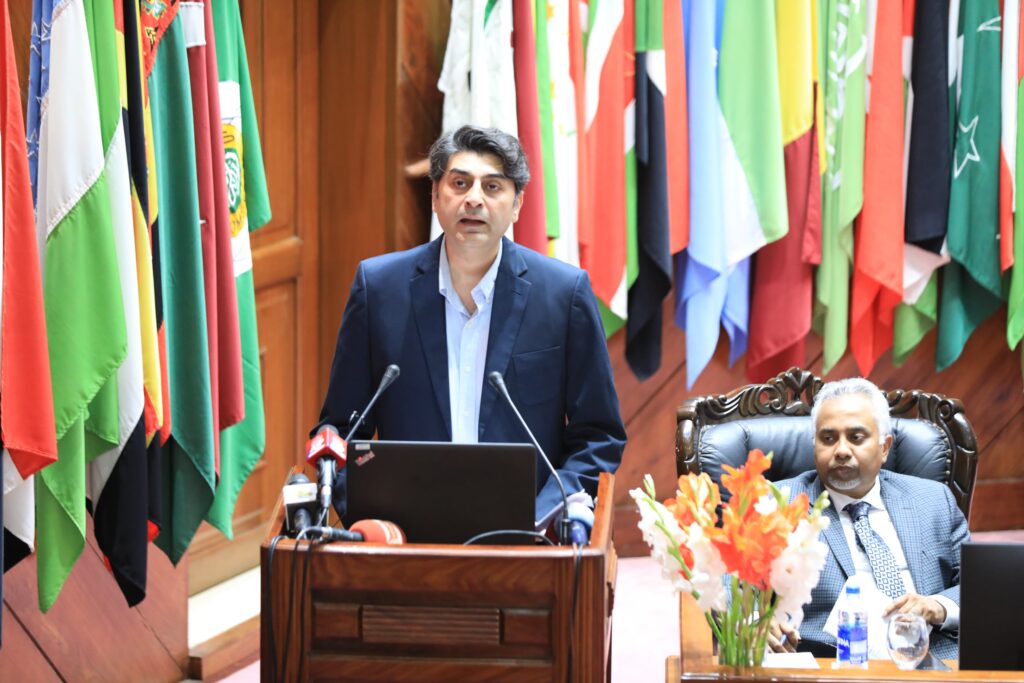
Islamabad:– The One-Day International Conference on Sustainable Health Systems and Resilience: Challenges and Opportunities concluded at COMSTECH, which was organized by the Manhattan Strategy Group, a prominent US-Pakistani social and human development organisation, in collaboration with partner organizations. The conference underscored the essential contributions of public health workers in Pakistan.
The conference was inaugurated by Dr. Malik Mukhtar Ahmad Bharath, Coordinator to the Prime Minister of Pakistan on National Health Services, Regulations, and Coordination. In his opening remarks, Dr. Bharath commended the organizers for their dedication and emphasized the importance of collaborative efforts in strengthening Pakistan’s health systems. He highlighted the urgent need for resilient health systems amid global health security challenges and climate change.
Dr. Bharath addressed the significant impacts of the 2022 floods, which displaced millions and highlighted gaps in healthcare delivery. He advocated for enhanced primary healthcare access, innovative financing models like health insurance schemes, and a collaborative One Health approach to integrate human, animal, and environmental health sectors. He concluded by emphasizing the need for evidence-based policymaking and strengthening partnerships to effectively tackle health challenges.
The conference featured keynote addresses from prominent figures in global health. Dr. Erin Sorrell, a global health practitioner and Associate Professor at the Johns Hopkins Bloomberg School of Public Health, opened the discussions by highlighting the importance of innovative approaches in combating health crises. Following her, Dr. Hammad Ali, adjunct Associate Professor Brown University and Associate Branch Chief at the US Centre for Disease Control and Prevention (CDC) provided insights on integrating public health strategies into community health initiatives. The final keynote was delivered by Prof. Dr. Aamer Ikram, former Executive Director, NIH Pakistan, Country Representative, MSG, who addressed the intersection of public health and national security.
Throughout the day, the conference hosted five technical sessions that delved into critical areas of health system transformation. Topics included health system strengthening, universal health coverage, public-private partnerships, data integration, and climate resilience. Experts from around the globe engaged in meaningful discussions, focusing on strategies to tackle significant challenges facing Pakistan’s health sector, particularly in the context of rising global health risks.
Key discussions revolved around the need for robust data integration systems to inform policy decisions and the critical role of climate resilience in public health planning. Panellists emphasized that without integrating these considerations, Pakistan’s health system may struggle to adapt to future challenges.
In conjunction with the conference, Mr. Shezad Habib launched the Manhattan Strategy Group platform in Pakistan. As the president and founder of the group, Mr. Habib highlighted the contribution and explained that this initiative aims to enhance the organization’s focus on healthcare issues and foster partnerships with government bodies, NGOs, and private organizations. “The establishment of this platform signifies our commitment to addressing the healthcare challenges faced by Pakistan and our dedication to creating sustainable solutions,” he stated. Mr. Salik Malik, Vice President of International Development at MSG conducted the proceedings of the conference.
The conference attracted over 150 attendees, including health professionals, government officials, academic researchers, and representatives from international organizations. This diverse gathering marked a pivotal moment for stakeholders invested in the future of healthcare in Pakistan and beyond. Attendees participated in workshops and networking sessions designed to cultivate partnerships and facilitate collaboration among various stakeholders.
The conference concluded with a call to action for all stakeholders to prioritize investment in health system resilience and sustainability. Organizers emphasized the importance of ongoing collaboration and dialogue, stating that the insights gained from the conference should inform future policy and programmatic efforts.
